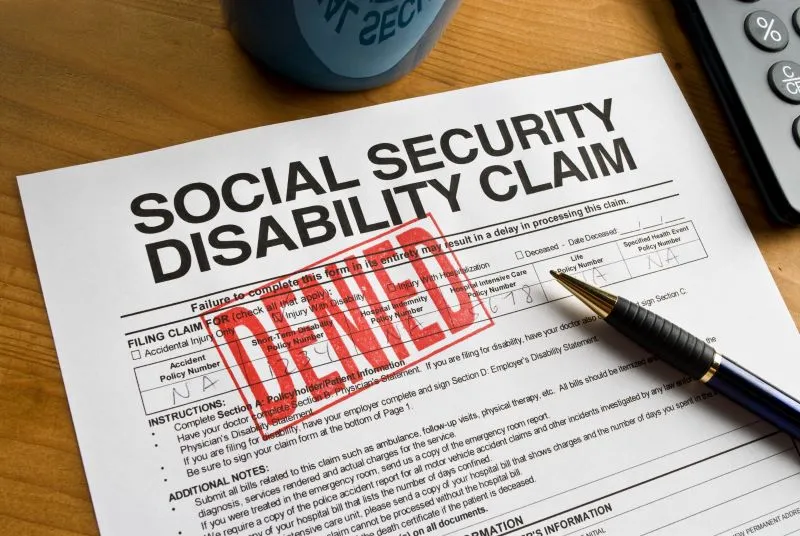Applying for disability benefits can be a long and—at times—arduous process. Between the need to create and provide extensive documentation, the long wait times, and the daunting appeals process, getting approved can take months—or even years. As such, when you’re denied for disability, the questions of what to do, how to move forward, and whether you have any way to get approval despite the setback can be overwhelming.
However, that doesn’t mean you’re without hope! While a denial can seem like the end of the world, you’re hardly alone. A staggering 67% of SSDI benefit claims are rejected upon after their first application, but 35% will be approved upon appeal, in addition to 8% and 2% respectively for approvals at the reconsideration and hearing levels. If your application for Social Security Disability Insurance has been denied, consider these next steps to learn what to do to contest the decision.
Ready to see if you may qualify? Click here to get a FREE, no-obligation consultation before starting your claim.
What Should I Do If My SSDI Application Was Denied? Key Takeaways
- SSDI benefits applications are challenging due to the extensive documentation needed and the possibility of a long appeals process.
- Initially, many SSDI applications are denied, but many are approved through appeals.
- Reasons for denial can include technical errors, insufficient medical evidence, multiple applications, earning too much income, non-qualifying medical conditions, or a lack of sufficient work credits.
- To improve your chances of success, provide comprehensive medical evidence, including surgical notes, test results, imaging reports, doctors’ notes, employer statements, and statements from friends and family.
- Legal assistance can be beneficial, as an experienced attorney can help navigate the complex system and provide guidance on presenting a strong case.
Why Was My SSDI Claim Denied?

There are a number of reasons that SSDI benefits applications are denied. While a claim denial can make it seem like the government doesn’t think you qualify, a significant portion of denials stem from technical errors in the application process. According to the Social Security Administration (SSA), 38.22% of all applications between 2010 and 2019 were denied because of technical issues with their application, compared to 28.29% for medical denials.
SSDI Disability Application Outcomes By Type
Source: SSA.gov
Because the reasons you may face a disability denial can be so varied, understanding each of them is key to improving your application for the appeals process. Here’s a look into the reasons your SSDI benefits claim may have been rejected.
Top 7 Reasons Your Disability Claim Was Denied
- You made a mistake filling out your application, which is called a “technical denial.”
- You haven’t worked at least 5 in the last 10 years full time while paying Social Security taxes.
- You’re still working when you apply for disability benefits.
- You’re at full retirement age and can draw regular Social Security payments instead.
- Your doctor says you’ll improve enough to start working again in less than a year.
- You don’t regularly see a doctor to treat your disability (or didn’t provide medical evidence that supports your claim).
- Your monthly earnings are $1,350 or more (even if you’re unemployed).
You’ve Provided Insufficient Medical Information
One of the common reasons SSDI claims are denied is because the Social Security Administration doesn’t agree that the applicant meets its disability criteria. Oftentimes, this is because the application does not include sufficient medical evidence to prove you’re unable to work.
42.5 million Americans live with disabilities, making up approximately 13% of the overall population. However, many of those Americans are still capable of work, be it in specific fields or with the appropriate accommodations. Disability benefits are meant to support Americans who are completely unable to work under any circumstance. Because of this, your application needs to do more than prove you have a disability: it also needs to prove that your disability prevents you from supporting yourself.
If the medical file you provided is sparse or lacks a clear diagnosis, or if you haven’t sought any medical care for your condition, this may lead to a denial of your SSDI application. Additionally, if the documentation you provided does not include supporting evidence that your disability impacts your ability to work, such as accommodation requests and doctors notes issued to previous workplace environments, you may be at a higher risk of having your application rejected.
You’ve Submitted Multiple Applications
2 million people apply for disability benefits annually, which means it’s important to follow the appropriate processes when applying for or appealing disability benefit decisions.
A significant portion of applications for SSDI payments are denied because they didn’t provide enough evidence to prove the need for disability support. Because of this, it’s better to appeal a denial instead of reapplying, including new evidence with your appeal that supports your claim. If an SSA reviewer sees you were previously denied disability benefits based on a similar application, you may be denied again rather than have your case fully reviewed.
Instead of submitting a new application, be sure to go through the appeals process instead to have your application looked at again. This is where consulting with an attorney can be beneficial, as they will be more familiar with the process and the level of detail necessary in your application to have it be considered.
You Earn Too Much Money
SSI and SSDI benefits are awarded to individuals who are unable to support themselves due to disability. Therefore, if you are working and earn income at a level that the SSA considers to be “substantial gainful activity,” or SGA, your claim for disability benefits is likely to be denied. The amount is adjusted periodically for inflation but currently sits at $1,550 per month for sighted applicants and $2,590 for blind applicants as of 2024.
Substantial Gainful Activity Amounts Year Over Year
| Year | Blind Individuals | Sighted Individuals |
|---|---|---|
| 2015 | $1,820 | $1,090 |
| 2016 | $1,820 | $1,130 |
| 2017 | $1,950 | $1,170 |
| 2018 | $1,970 | $1,180 |
| 2019 | $2,040 | $1,220 |
| 2020 | $2,110 | $1,260 |
| 2021 | $2,190 | $1,310 |
| 2022 | $2,260 | $1,350 |
| 2023 | $2,460 | $1,470 |
| 2024 | $2,590 | $1,550 |
Source: SSA.gov
Your Condition Is Not a Qualifying Medical Condition
The SSA maintains a list of medical conditions it considers severe enough that a person cannot engage in substantial gainful activity. However, the list is not comprehensive, and if an applicant’s medical issue does not fit neatly into one of the impairment categories, the SSA will decide if the applicant’s condition is comparable to one of the conditions on the list. If they determine you may be able to pursue other types of work, it’s likely you’ll be denied.
In such a case, appealing and getting the opportunity to speak to a judge about your disability may improve your chances of being approved.
Your Employment History Is Not Long or Recent Enough to Qualify for SSDI
With both SSI and SSDI providing disability benefits for individuals who can’t, it can be confusing for applicants to understand the requirements for each. SSI, or Supplemental Security Income is paid to anyone with a disability who is unable to support themselves. Whereas SSDI, or Social Security Disability Insurance, is paid out to workers who have made contributions to the Social Security system.
In order to qualify for SSDI, applicants need to have earned a certain amount of “work credits,” which are earned through reported yearly wages and self-employment income. Work credits are earned for each quarter of a year that an individual works at or above a certain threshold of income ($1,730 per quarter in 2024).
SSDI applicants need to have earned at least 40 work credits, 20 of which must have been earned in the last 10 years. Younger applicants may need fewer work credits.
- Before age 24: 6 credits within the 3 years prior to the start of your disability
- Age 24 to 31: Generally need to have credit for working half of the time between age 21 and the start of your disability
- Age 31 or older: 40 credits in total, and 20 credits in the 10-year period prior to the start of your disability
If you don’t have sufficient work history to qualify for SSDI, consider applying for SSI benefits instead to help support yourself.
How to Improve Your Social Security Disability Benefits Application
Ensuring that your Social Security Disability Insurance application is successful hinges on providing as much documentation as possible. From comprehensive medical evidence to the support of doctors, employers, and others who can attest to your condition, each piece plays a critical role in demonstrating the need for financial assistance.
Key Documentation for a Successful SSDI Application
- Medical Evidence: This includes but is not limited to surgical notes, test results, imaging reports, and any other documentation that can substantiate your health condition.
- Residual Functional Capacity (RFC) Form: Your treating physician must fill out this form to articulate the severity of your condition and how it impacts your ability to work.
- Doctor’s Notes: Your doctors’ notes that reflect the progress and nature of your condition over time can be instrumental.
- Employer and Coworker Statements: Statements from those you worked with can help provide a comprehensive picture of your health condition and its effects on your work performance.
- Statements from Friends and Family: Those who know you personally and have seen how your condition affects your daily life can offer a unique and critical perspective.
Supplying the above information when you appeal your SSDI denial can improve your chances of success when your case is reviewed again.
How Does the SSDI Appeals Process Work? Steps to Take When Your SSDI Application is Denied

The appeals process for SSDI benefits involves multiple steps that allow for your application to be reviewed, lets you submit additional information missing in your initial submission, and even speak directly with a judge to plead your case.
File an Appeal Immediately
As soon as you receive notice that your application was denied, you should begin to prepare your appeal. The first step, Reconsideration, will involve updating your application with any missing information to make your case stronger. To do so, you’ll need to complete and file Form SSA-561 within 60 days of receiving your denial letter. This can be submitted either by appointment at your local SSA office or by mail.
During the appeals process, it’s generally recommended to seek out a relationship with SSDI attorneys who can help with your case. If you’re already working with a lawyer, they will handle the appeals paperwork for you.
Request a Hearing with an Administrative Law Judge
As with Reconsideration, you will have 60 days to request a hearing with an Administrative Law Judge to contest your disability benefits denial. The Office of Disability Adjucation and Review (ODAR) will typically schedule appeal hearings 7-18 months after receiving your request, though times vary by state.
Request Review by the Appeals Council
If you’re denied again after your hearing, you’ll have another 60 days to dispute the judge’s ruling. At this point in the process, the odds of approval are lower unless one of two things are true:
- The ALJ hearing may have ended prematurely or resulted in an incorrect decision due to an error made by the judge. The Appeals Council has the authority to reevaluate your case, either rejecting it entirely or overturning the ALJ’s ruling.
- If your SSD case implies significant policy or procedural issues, particularly if expert testimony was given at your ALJ hearing or if your impairment is a novel development, these circumstances apply to you.
Work with a Lawyer to Improve Your Disability Application
If you’re feeling lost after being denied Social Security Disability Insurance (SSDI), you’re not alone. The process can be complex, and denials are not uncommon. However, remember that a denial is not the end of the road. Many applicants eventually receive approval after appeal, and there are strategies you can use to strengthen your case.
Remember, the appeals process can take time. Be patient and stay persistent. Seeking legal assistance from an SSDI attorney can also be beneficial, as an experienced attorney can guide you through the process and help you present the strongest possible case.
Ready to see if you may qualify? Click here to get a FREE, no-obligation consultation before starting your claim.
Social Security Disability Benefits Denial: Frequently Asked Questions (FAQ)
What is Reconsideration?
Reconsideration is the first stage of appeal after a Social Security Disability Insurance (SSDI) claim is denied. It involves a review of your application by a different adjudicator from the Social Security Administration (SSA) than the one who initially denied your claim.
How Long Does it Take for Social Security to Make a Reconsideration Decision?
The time it takes for the SSA to make a reconsideration decision varies, but it can typically take several months, depending on the complexity of your case and the volume of appeals the SSA is processing.
How long does it typically take for Social Security to process a request for an Appeals Council Review?
The processing time for an Appeals Council Review can also vary, but it usually takes between 7 and 18 months, or potentially longer, for the Appeals Council to make a decision on your appeal.
Can reaching out to my Congressional Representative improve my chances of receiving Social Security disability benefits?
Reaching out to your Congressional Representative can potentially help by prompting the SSA to expedite your case or providing additional information to support your appeal. However, it does not guarantee approval of your claim.
If my doctor and/or the VA has confirmed my disability, why was my claim for SSDI denied?
The SSA has its own specific criteria for determining disability, which may differ from other organizations or medical professionals. For the SSA to award SSDI disability benefits, you need to be able to prove that your disability prohibits you from being able to work.
How can I find an attorney to represent me on my Social Security disability claim?
You can find an attorney specializing in SSDI claims by researching online, asking for recommendations from friends or family, or seeking assistance from local legal aid organizations.
Is disability usually denied the first time?
Yes, it is common for SSDI claims to be denied upon first application. Many applicants are eventually approved after the appeals process.
Why is SSDI so hard to get?
SSDI is difficult to obtain because of the stringent eligibility criteria and the thorough review process conducted by the SSA to ensure that only those truly unable to work due to disability receive benefits.
What disqualifies you from Social Security?
You can be disqualified from Social Security for the following reasons:
- If you do not meet the SSA’s criteria for disability
- If you earn income above the substantial gainful activity (SGA) level
- Or if your condition is not on the SSA’s list of approved medical conditions.
Shay Fleming is the SEO Content Manager at LeadingResponse, a prominent legal marketing company. A proud graduate of Texas State University, she has been based in Austin since 2016, where she lives with her dog. Shay has contributed extensively to various domains, writing and publishing articles about real estate, investing, disability, and urban living.

